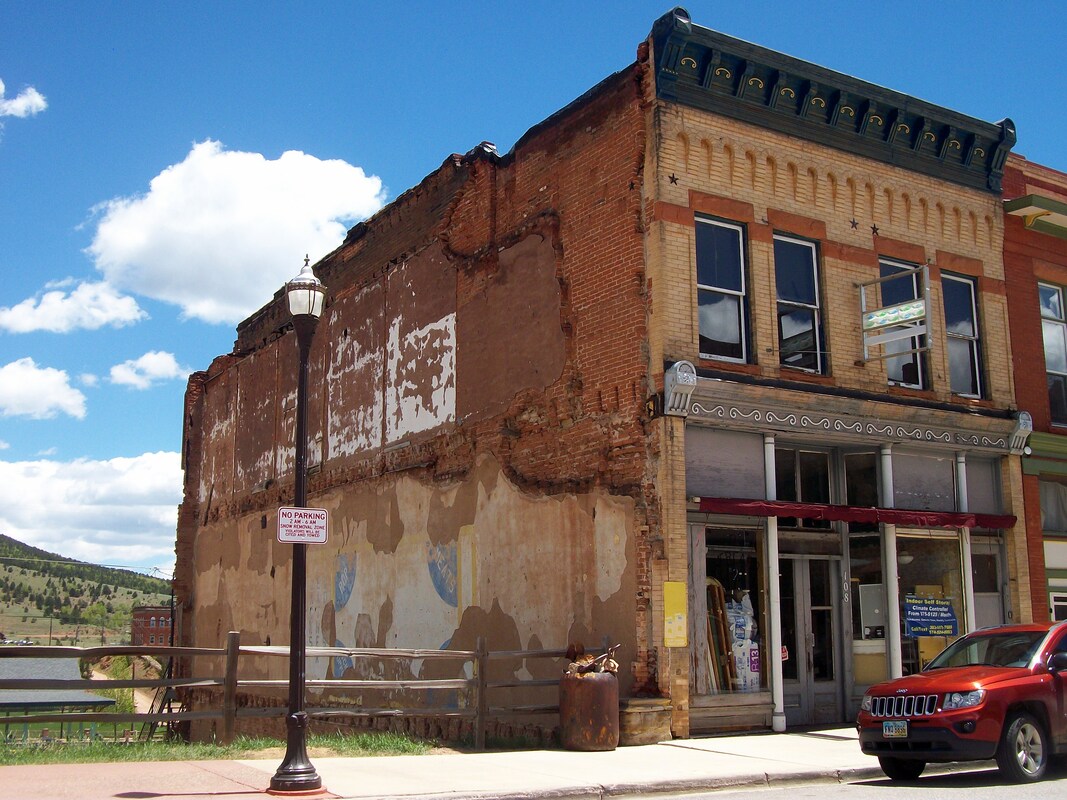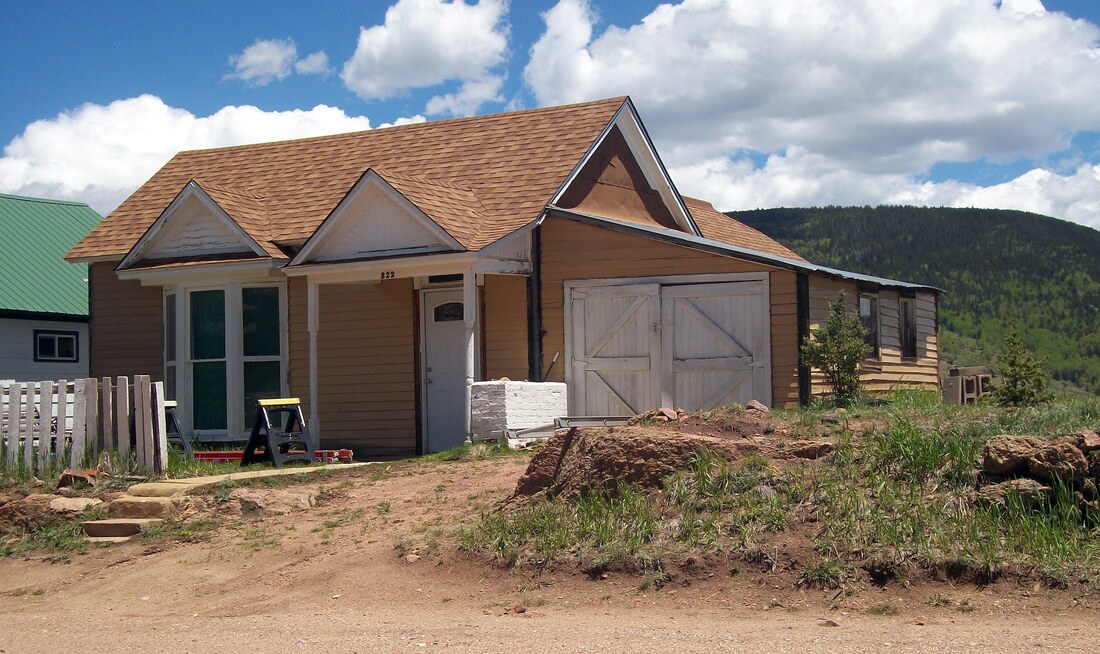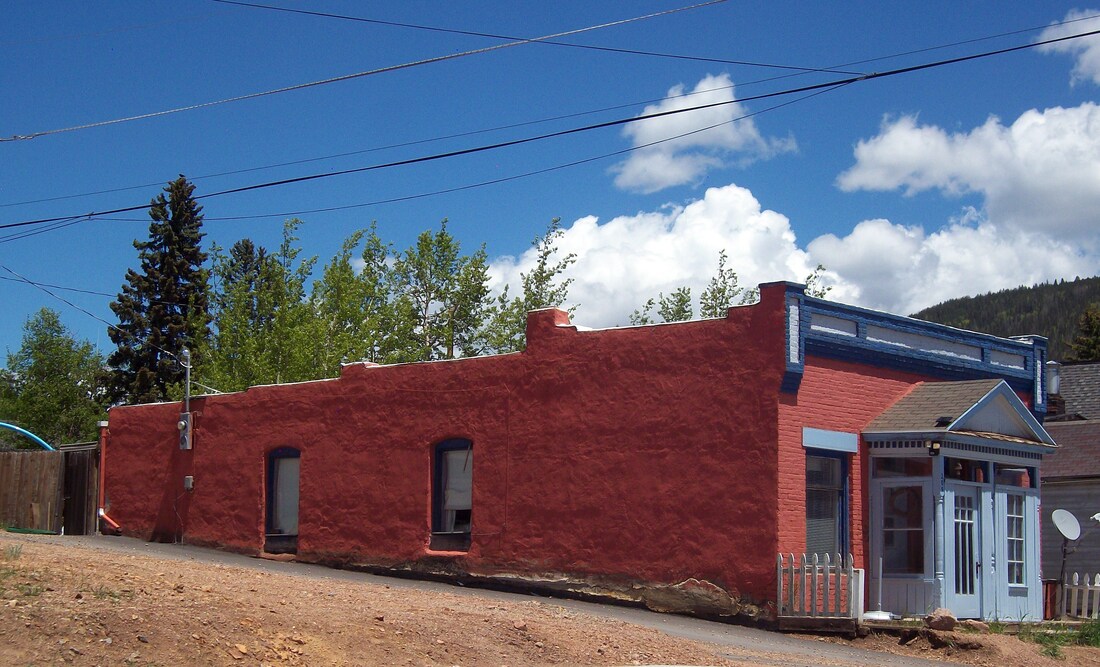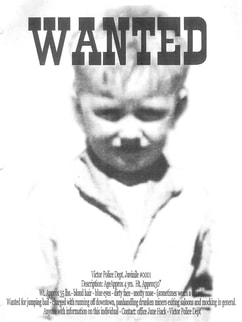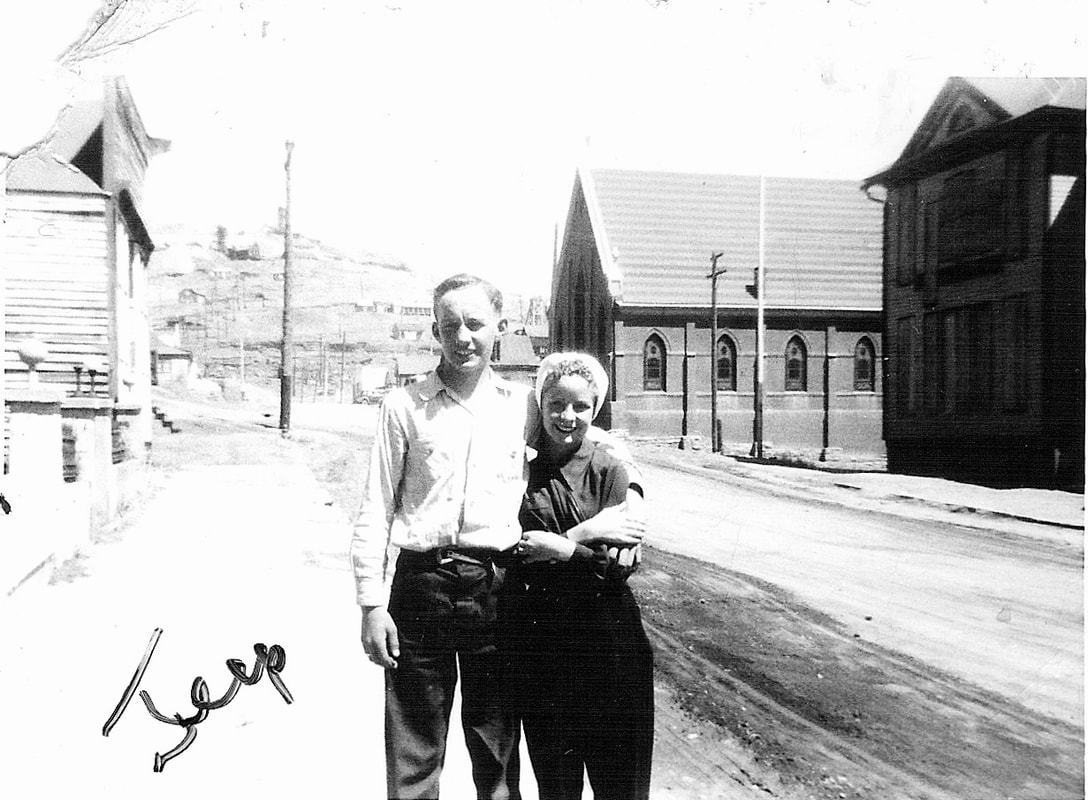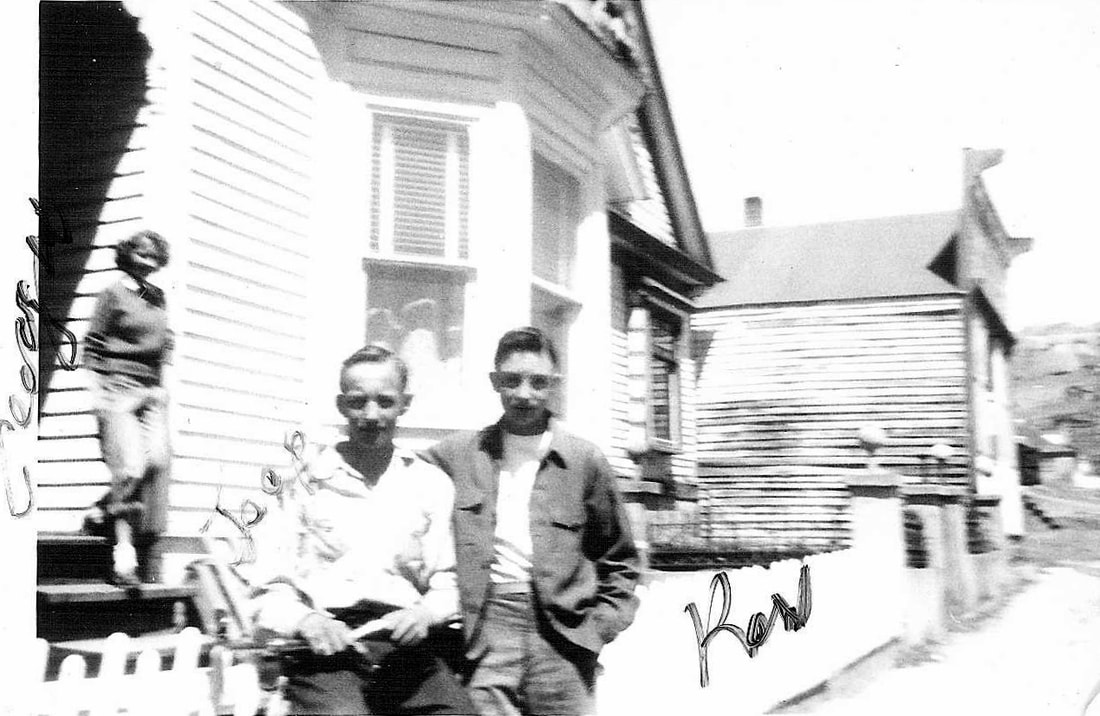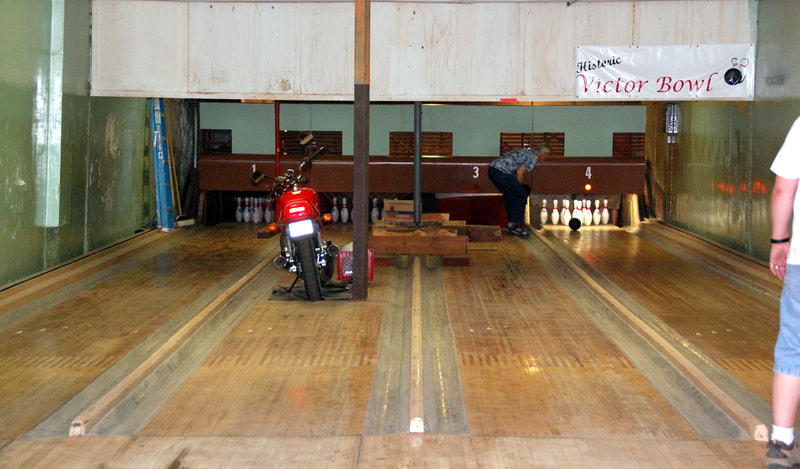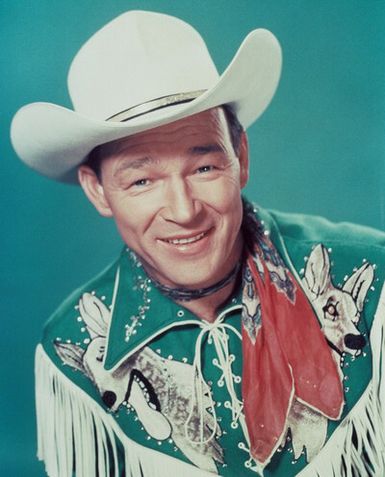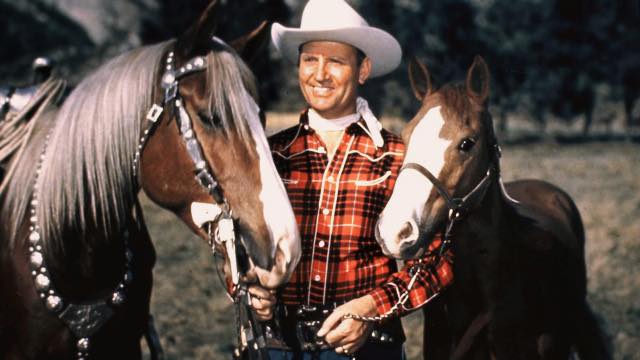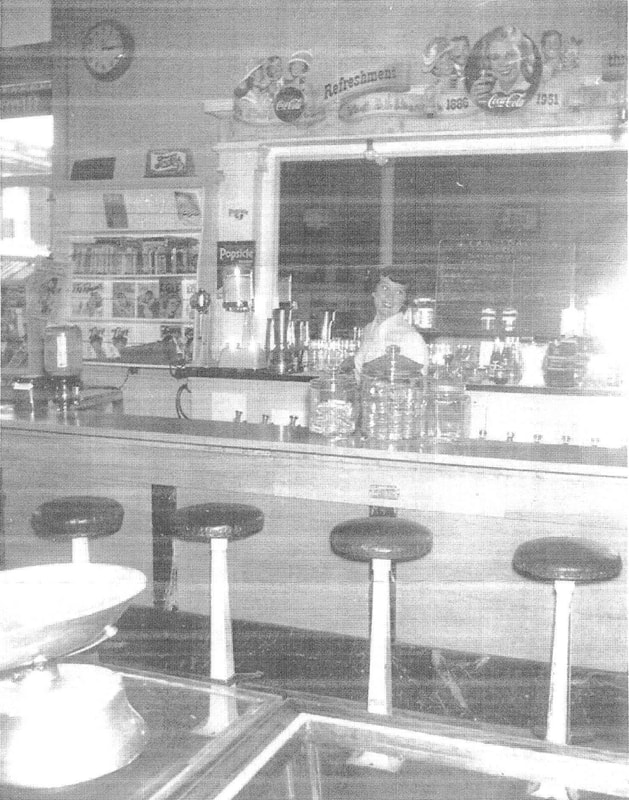RECOLLECTIONS OF MY LIFE IN VICTOR, COLORADO DURING THE DEPRESSION, WWII & AFTER by Charles Norman Spray (AKA Jeep Hack). ©
My name is Charles Norman Spray. I was named after two of my uncles, Kenneth Norman Hack and Charles Hack. I was born in Canon City, Colorado (Orchard Park) in August of 1935 at the home of my grandparents, Henry and Ina Hack. The money that my uncle June Hack had made from one of his prize fights paid the doctor bill. I was to spend my early years and a lot of my growing up years in the Hack home. There were six boys, three girls and with the addition of my sister Cleon and me, we filled up all the seats at the breakfast table.
The family moved to Victor, Colorado when I was still in diapers. Pops (my grandfather) was a barber and could make more money up there. It was still in the Depression, but Victor was booming. The mines were working three shifts a day, producing a lot of payroll. We had a hard time finding a place to live and, as I recall, we moved a lot! I can remember sleeping with three of my uncles and fighting for covers and some room and fresh air. Pop Hack and my uncles were my companions and mentors--the father and brothers I never had.
My name is Charles Norman Spray. I was named after two of my uncles, Kenneth Norman Hack and Charles Hack. I was born in Canon City, Colorado (Orchard Park) in August of 1935 at the home of my grandparents, Henry and Ina Hack. The money that my uncle June Hack had made from one of his prize fights paid the doctor bill. I was to spend my early years and a lot of my growing up years in the Hack home. There were six boys, three girls and with the addition of my sister Cleon and me, we filled up all the seats at the breakfast table.
The family moved to Victor, Colorado when I was still in diapers. Pops (my grandfather) was a barber and could make more money up there. It was still in the Depression, but Victor was booming. The mines were working three shifts a day, producing a lot of payroll. We had a hard time finding a place to live and, as I recall, we moved a lot! I can remember sleeping with three of my uncles and fighting for covers and some room and fresh air. Pop Hack and my uncles were my companions and mentors--the father and brothers I never had.
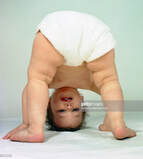 The "Jeep" stance that earned me my nickname.
The "Jeep" stance that earned me my nickname.
It was when we lived above Hatcher’s Grocery that I acquired the name “Jeep”. The little Jeep character in the Popeye comic strip in the 1930’s, when paged, would bend over and look back between his legs. One day when I was running down the hall in diapers, Pops called me and I, like the “Jeep” answered his page by bending over and looking back between my legs. Pops’ comment was, “Look at that kid! He looks just like the “Jeep”. The name stuck. Thereafter, I was either the “kid” or “Jeep” to family and friends.
One day my Uncle Clyde (the original Horse Whisperer) rode up to the Green Parrot Restaurant where my mom (Phyllis Hack) and grandma (Ina Hack) were working. Clyde took me outside (diapers and all), put me in the saddle in front of him, and took me for a ride. When we returned, Mom said I was so cold that my lips were blue. When they tried to take me off the horse, Clyde later said I almost tore the saddle horn off, not wanting to get off. I was to be “horse crazy” the rest of my life.
One day my Uncle Clyde (the original Horse Whisperer) rode up to the Green Parrot Restaurant where my mom (Phyllis Hack) and grandma (Ina Hack) were working. Clyde took me outside (diapers and all), put me in the saddle in front of him, and took me for a ride. When we returned, Mom said I was so cold that my lips were blue. When they tried to take me off the horse, Clyde later said I almost tore the saddle horn off, not wanting to get off. I was to be “horse crazy” the rest of my life.
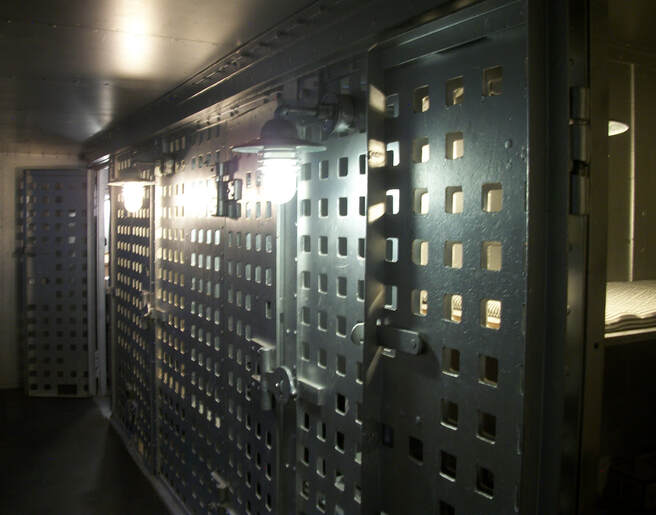 The Historic Jail in the Victor City Hall was restored along with the rest of the building in 2004. The jail is now part of the museum area in the building and now longer available to constrain rebellious four-year-old children. Photo shared by Shirley Beach, 2019.
The Historic Jail in the Victor City Hall was restored along with the rest of the building in 2004. The jail is now part of the museum area in the building and now longer available to constrain rebellious four-year-old children. Photo shared by Shirley Beach, 2019.
While I always had a babysitter, at four years old I was prone to run off downtown to panhandle the miners coming out of the saloons. I had developed a taste for penny candy. The nickel or penny I mooched from the miners helped me in that requirement. One day my Uncle June caught me downtown and threw me in jail. My mother got me released, but I can still hear the cell door clanging! At age of four, I held the distinction of being the youngest kid in Victor with a record.
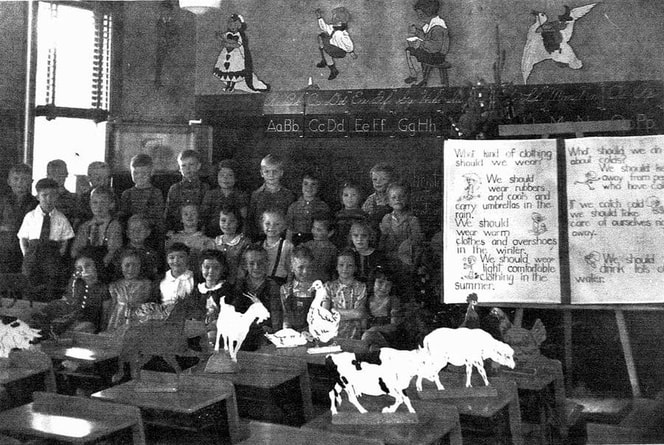 First Grade Class at the Washington School, Victor, Colorado, 1941. Charles Spray (AKA Jeep Hack) is seated directly behind the "goat cut-out". Photo shared by Nancy Galbraith.
First Grade Class at the Washington School, Victor, Colorado, 1941. Charles Spray (AKA Jeep Hack) is seated directly behind the "goat cut-out". Photo shared by Nancy Galbraith.
The 1930’s and 40’s were in general tough times. But there were also a lot of good times to go along with the bad. These were a couple of decades that produced Era’s of note.
As I grew older, in the summer I roamed the surrounding mountains. There were, and still are, donkeys running around the countryside loose, after being no longer used to pull ore cars in the mines. They provided a great mount, for a “would be” cowboy! There was one white donkey named “Cookie” that was my favorite. She would gallop on cue – something donkeys aren’t prone to do. That little burro and I covered a lot of country together.
As I grew older, in the summer I roamed the surrounding mountains. There were, and still are, donkeys running around the countryside loose, after being no longer used to pull ore cars in the mines. They provided a great mount, for a “would be” cowboy! There was one white donkey named “Cookie” that was my favorite. She would gallop on cue – something donkeys aren’t prone to do. That little burro and I covered a lot of country together.
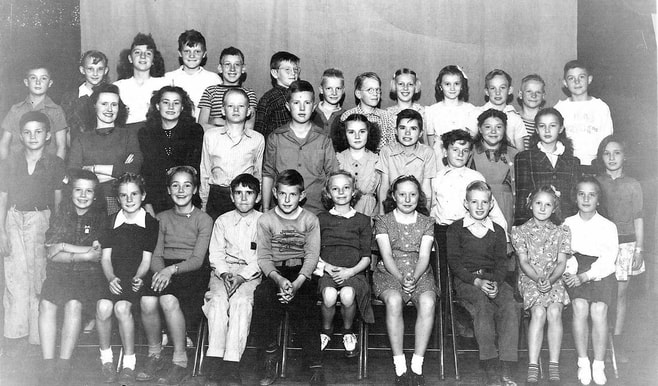 1945-46 Sixth Grade Class. Jeep Hack (back row, 3rd from right). Classmates include Norman Olson (back row, 7th from right) and Georganna McCleerey (1st row, 2nd from left). Photo shared by Georganna McCleerey Peiffer.
1945-46 Sixth Grade Class. Jeep Hack (back row, 3rd from right). Classmates include Norman Olson (back row, 7th from right) and Georganna McCleerey (1st row, 2nd from left). Photo shared by Georganna McCleerey Peiffer.
I’d also roam the ore dumps, find some rocks with iron pyrite and sometimes a piece with a trace or two of gold ore, put them in an old cigar box lined with cotton, then meet the tourist busses that came to town and try to sell them some “gold”. Sometimes tourists were reluctant to buy a specimen of the raw “gold” since the gold that Victor mines produced wasn’t a gold color. It was a telluride of silver-colored gold. When roasted, it would produce the gold color. The bus drivers sometimes helped out by explaining that oddity to the tourists.
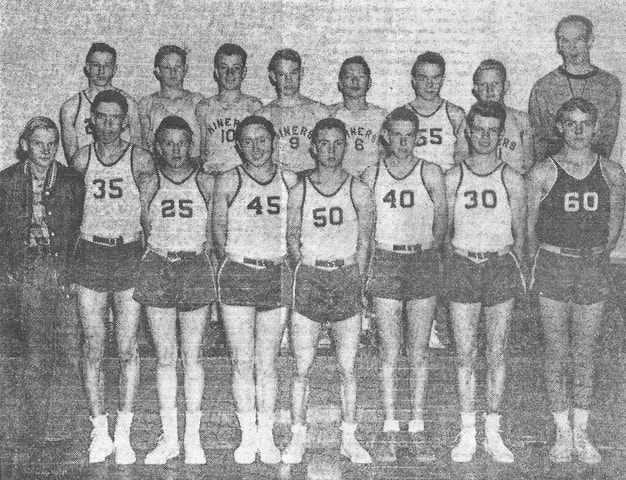 Victor Miners Championship Basket Ball Team--Feb 16, 1951. Back row, L to R, Grover Thomas, Raymond Cox, Donald McShane, Don Stevenson, Don Jenks, Ulmer McCleerey, Otto Gardner and coach Bob Elliott. Front row, L to R, Norman Olson, manager, Kenneth Hansen, Merle Hildreth, Don Pedrie, Kenneth Follansbee, Raymond Martin, Charles Porter, and Charles Clark. Zen Greenlee is not shown in the picture as he was sick when it was taken. Newspaper photo clipping shared by Georganna McCleerey Peiffer.
Victor Miners Championship Basket Ball Team--Feb 16, 1951. Back row, L to R, Grover Thomas, Raymond Cox, Donald McShane, Don Stevenson, Don Jenks, Ulmer McCleerey, Otto Gardner and coach Bob Elliott. Front row, L to R, Norman Olson, manager, Kenneth Hansen, Merle Hildreth, Don Pedrie, Kenneth Follansbee, Raymond Martin, Charles Porter, and Charles Clark. Zen Greenlee is not shown in the picture as he was sick when it was taken. Newspaper photo clipping shared by Georganna McCleerey Peiffer.
In the summers we learned to play baseball. In the winter we had fun sledding on the hills and ice skating on a flooded ballpark. But winters were long and hard at Victor’s altitude. Snow and cold forced us inside the local auditorium where we learned to play basketball, boxing and other games. Over the years, with the same group growing up pretty much together and knowing each other’s capabilities, we produced some good teams. Our 8th grade basketball team beat all comers and won the Pikes Peak Junior High Championship.
Growing up I was fortunate to have something to eat on a regular basis. Many, many other people didn’t. It was the depression and thousands were without work, food or a place to sleep. We were fortunate to be living in Victor where mining jobs and the local economy was booming. Although very young, I can remember almost every member of the Hack Family had a job of some kind that put food on the table. I remember having many mediocre jobs in my early years—nickel and dime chores for the most part. My first real “jobs” that produced a paycheck were delivering newspapers, shoveling coal, and working in the timber at times.
Growing up I was fortunate to have something to eat on a regular basis. Many, many other people didn’t. It was the depression and thousands were without work, food or a place to sleep. We were fortunate to be living in Victor where mining jobs and the local economy was booming. Although very young, I can remember almost every member of the Hack Family had a job of some kind that put food on the table. I remember having many mediocre jobs in my early years—nickel and dime chores for the most part. My first real “jobs” that produced a paycheck were delivering newspapers, shoveling coal, and working in the timber at times.
Then came the war! World War II helped pull America out of the depression, but it killed the local economy in the Victor & Cripple Creek Mining District. Most all the young men went off to war. Families were separated and split apart. We moved down to Colorado Springs where we lived during the war at 314 West Brookside Avenue.
Thousands of young men would lose their lives in the war. One Hack son would not return--Victor Hack, another would be “Cowboy”. He left behind a young wife, a three year old son who was killed in an accident soon after his father’s death, and a baby that was born a few months later and christened Victoria Hack. Seven of the eight Hack sons eventually served in the military—more sons than any other family in the State of Colorado. In time thousands of boys would return home broken in body and spirit after what they had seen and witnessed—wounds that would never heal.
It seemed that one of the Hack boys was always home on a leave and they always had a piece of military garb for me. I looked like a walking army surplus store. I had navy hats, army caps and a Marine Corps jacket. At a later time, my Uncle Chub brought me a brand new pair of army combat boots. I walked many miles and flattened out many of the surrounding mountains in those boots over the years.
Pops had learned about “steam” when he was a young fireman on the engine of grandma Hack’s father—an engineer on the local railroad who knew how steam worked and how to use it. It was here that Pops met, wooed and later married the engineer’s daughter—my Grandmother Ina (Roundtree) Hack.
During the war Pops worked in Camp Carson (the forerunner of today’s Fort Carson). All the barracks at that time were heated with steam radiators. I’d go with Pops when he worked the night shift overseeing the boilers and the heating operation. Before long I’d get sleepy, crawl up on one of the ladders to the top one of the big boilers, and lie down in a warm comfortable spot and go to sleep. I was a rapidly growing boy with a body needing sleep.
A different way of life existed during the war. Many items we now take for granted and use today were not available, in existence, or were very much different then. There was rationing with stamps required for almost everything we consumed or wanted to have. The word “stamps” came to have a new meaning and use. If available, you could purchase items on a limited basis “only” if you had the appropriate stamps for that item or service. Stamps issued to a family were based upon the number of individuals in the family. A business received stamps based upon its contribution or need to help further the war effort. You received your allotted number of stamps that were issued by the government on a monthly basis. When you used up your monthly stamps on any certain item or product you did without that item or product until you received your next allotment of stamps. I remember especially the scarcity of sugar, meat, butter, shoes, chocolate, gum and cigarettes. Gas (when available) required limited stamps for so many gallons and was always a problem as were tires. Cigarettes were something that a vast majority of men learned to use in the service in order to pass the time away sitting around waiting for something to happen. More men probably came home from the war as smokers than when they entered the service.
The Hack home at that time was on the outskirts of the “Springs” in a somewhat rural area and Pops raised rabbits in thirty hutches out back. Each morning he and I would go out and clean cages, feed the rabbits, and then select some that we butchered. We’d take those carcasses into town and sell them to the local Piggly Wiggly Market. They really needed the meat we provided, as their meat cases were almost always empty of beef and pork. Pops couldn’t raise enough rabbits to fulfill that demand for “meat”.
Thousands of young men would lose their lives in the war. One Hack son would not return--Victor Hack, another would be “Cowboy”. He left behind a young wife, a three year old son who was killed in an accident soon after his father’s death, and a baby that was born a few months later and christened Victoria Hack. Seven of the eight Hack sons eventually served in the military—more sons than any other family in the State of Colorado. In time thousands of boys would return home broken in body and spirit after what they had seen and witnessed—wounds that would never heal.
It seemed that one of the Hack boys was always home on a leave and they always had a piece of military garb for me. I looked like a walking army surplus store. I had navy hats, army caps and a Marine Corps jacket. At a later time, my Uncle Chub brought me a brand new pair of army combat boots. I walked many miles and flattened out many of the surrounding mountains in those boots over the years.
Pops had learned about “steam” when he was a young fireman on the engine of grandma Hack’s father—an engineer on the local railroad who knew how steam worked and how to use it. It was here that Pops met, wooed and later married the engineer’s daughter—my Grandmother Ina (Roundtree) Hack.
During the war Pops worked in Camp Carson (the forerunner of today’s Fort Carson). All the barracks at that time were heated with steam radiators. I’d go with Pops when he worked the night shift overseeing the boilers and the heating operation. Before long I’d get sleepy, crawl up on one of the ladders to the top one of the big boilers, and lie down in a warm comfortable spot and go to sleep. I was a rapidly growing boy with a body needing sleep.
A different way of life existed during the war. Many items we now take for granted and use today were not available, in existence, or were very much different then. There was rationing with stamps required for almost everything we consumed or wanted to have. The word “stamps” came to have a new meaning and use. If available, you could purchase items on a limited basis “only” if you had the appropriate stamps for that item or service. Stamps issued to a family were based upon the number of individuals in the family. A business received stamps based upon its contribution or need to help further the war effort. You received your allotted number of stamps that were issued by the government on a monthly basis. When you used up your monthly stamps on any certain item or product you did without that item or product until you received your next allotment of stamps. I remember especially the scarcity of sugar, meat, butter, shoes, chocolate, gum and cigarettes. Gas (when available) required limited stamps for so many gallons and was always a problem as were tires. Cigarettes were something that a vast majority of men learned to use in the service in order to pass the time away sitting around waiting for something to happen. More men probably came home from the war as smokers than when they entered the service.
The Hack home at that time was on the outskirts of the “Springs” in a somewhat rural area and Pops raised rabbits in thirty hutches out back. Each morning he and I would go out and clean cages, feed the rabbits, and then select some that we butchered. We’d take those carcasses into town and sell them to the local Piggly Wiggly Market. They really needed the meat we provided, as their meat cases were almost always empty of beef and pork. Pops couldn’t raise enough rabbits to fulfill that demand for “meat”.
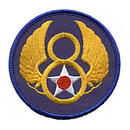 Eigth Air Force Shoulder Patch -- WWII.
Eigth Air Force Shoulder Patch -- WWII.
I remember one time near the end of the war in 1945 when I was lying on my back on the open balcony of the place where we were living. I looked up into the sky and witnessed a phenomenon that in all likelihood will never be seen again. The Air Force was moving its entire 8th Air Force fleet from the West Coast to the East Coast in preparation to being sent overseas to bomb Europe and Germany. The sky was filled with hundreds of B17 and B24 bombers escorted by fighter planes. The entire sky was almost blacked out by the vast number of planes. Later their presence in Europe and the mass bombings they produced would bring the war in Europe to a quick end. Dozens of cities were reduced to rubble. Thousands of innocent lives had been lost due to the madness of an evil regime. Thousands more became the casualties of the war. “War is Hell”!
With the end of a long and bloody war, men would be coming home to a different world. Many young men would not return to the home they had left. Having been exposed to new lands, people, customs and opportunities they would try to put back together some of the dreams they had known and been forced to leave behind. Only three of the Hack boys returned to Victor. My Uncles Ken and Charles decided to stay in the service. In later years both would retire as Senior Master Sergeants in their respective branch of service. Ken was serving on the Battleship Washington when Pearl Harbor was attacked on December 7th 1941. One of our few battleships to survive, it was out to sea when the attack occurred. Ken transferred to the army after the war and served in the infantry in Korea. Leading his unit he was wounded but continued to take over command of an officer-less platoon. Later he would be decorated with the Purple Heart, a Medal for Valor, and presented with the Bronze Star Medal.
We returned to Victor after the war. Pops reopened his barber shop and we settled down to a post war life. The Victor economy was picking up with some of the mines reopening and many other new jobs providing a payroll. Many of the items that had been scarce and required stamps were to become increasingly available and stamps for them would no longer be necessary. Things started to loosen up. There were still four or five saloons open, a bowling alley, a movie theater, several restaurants, four or five gas service stations and usually a dance at the Elks Lodge every Saturday night. The Elks Lodge was the center of attention. Every entertainment function seemed to take place there. Pops arose to become the Exalted Ruler of the Victor Elks Lodge 367.
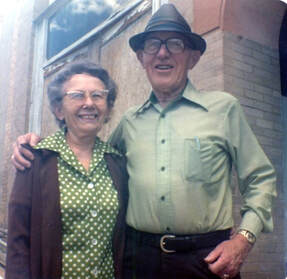 Gertrude and Ivan Harshbarger operated "Harshies" (now the Fortune Club). Ivan Harshbarger also served as the Victor Postmaster. 1980 photo taken in Victor shared by Jody Cottier Wells.
Gertrude and Ivan Harshbarger operated "Harshies" (now the Fortune Club). Ivan Harshbarger also served as the Victor Postmaster. 1980 photo taken in Victor shared by Jody Cottier Wells.
I had a job selling newspapers for a short time in Colorado Springs during the war. I can still remember standing on the corner of Bijou and Pikes Peak Avenue freezing my fanny off that winter. Later after the war I delivered papers in Victor. The paper route I had in Victor was a large one. The town was divided up and down north and south by State Highway 67 with the main street, Victor Avenue, running through it. I delivered a lot of papers which were heavy, especially the Sunday edition. At the onset of my delivery I’d carry and deliver the papers for the southern part of my route in lower Victor. In the meantime Ivan Harshbarger, who ran the local delivery system, would put the papers to be delivered around the upper part of my route in a culvert on the west end of my route just off main street. My route was a big one—just too large for me to carry all the papers at once when I started my delivery. I can still remember pulling my sled in the winter with its load of papers. I recall the crunching of the snow underfoot and the crystal clear air that carried the sounds from down below town -- the sound of dogs barking and people talking. I can’t remember how much I was paid nor can I remember exactly when I quit that job. I do remember the pay was a handsome amount considering the times.
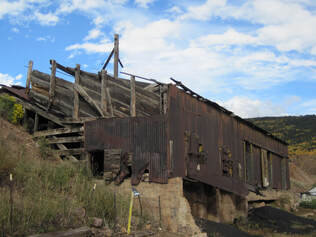 Coal hopper bins at Trade & Transfer Building (2014 photo).
Coal hopper bins at Trade & Transfer Building (2014 photo).
At that time everybody in Victor still had coal and wood stoves for heating and cooking. For a time I was in the coal business so to speak. The Trading and Transfer Company supplied the coal for the community. They had hopper bins that allowed trucks to draw up underneath and pull the coal out of them. The train and the box containing the coal were on the railroad line running above and beside the hoppers. The coal in the cars had to be manually shoveled into the hopper. Three of my friends and I would crawl on our bellies into the top of the car loaded with nut coal and begin to empty it out by scooping off the top layers, using our hands and a shovel to scrape. This was slow dirty work that took two days time. It wasn’t until we got down to the flat floor of the car that we were able to start shoveling the coal into the hopper beside the car. That took two more days. The railcar held forty tons. We were paid $40 for emptying the contents into the hopper. That forty dollars split four ways gave each of us a hefty $10 bill. This was a lot of money for four hard working boys considering miners mucking (digging) in the mines at the time were paid $6 a day.
|
From time to time I was able to get a job setting pins at the local bowling alley. The machines that actually set the pins were heavy and hard to set down. I remember my Uncle Lester setting pins in the alley next to me. Being bigger and stronger than me, he’d reach over, grab the machine bar and help me set the machine down. We got paid so much a line plus tips for our labors.
|
The Victor Bowling Alley now opens only on special occasions. Perhaps this is the same manual pin setting machine once operated by Charles Spray (AKA Jeep Hack)? Photos taken during Victor's 2013 Gold Rush Days Celebration.
|
On Saturday night I’d take my dime and go to the movie at the “Isis” theater to watch Roy Rogers and Gene Autry round up the bad guys. For another dime you could get a bag of popcorn. If I had worked or was able to talk Mom out of an extra dime or two I’d go up to “Harshies” and get a malt or, better still, a “Tiny Tasty”. Those delightful dishes were pretty expensive, 20 cents. If you were so inclined and didn’t want anything in a glass you could purchase one, two or three huge scoops of the many ice cream varieties available on a cone.
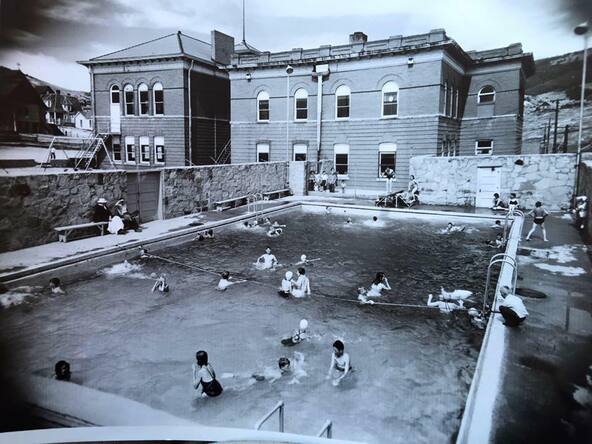 The Swimming Pool at the Cripple Creek School was added in the late 1940's. In the 1980's the building was converted to a small hotel now known as Carr Manor. Photo shared by John Linneman.
The Swimming Pool at the Cripple Creek School was added in the late 1940's. In the 1980's the building was converted to a small hotel now known as Carr Manor. Photo shared by John Linneman.
Sometimes if I had been a good boy lately, Mom would be a soft touch and give me money to ride the bus over to Cripple Creek and swim at the pool over there. While I’d ride the bus over, I’d take the money that was supposed to get me a bus ride home, go down and visit the corner drug store and get a chocolate malt and a couple of peanut butter filled cheese crackers. Then I’d walk the six mines back to Victor, stopping along the way now and then to pick a few wild raspberries growing along the old railroad bed above the highway.
When summer rolled around we always had a multitude of games and things that we participated in. The most popular games were “kick the can” or “hide and seek”. In the evenings we’d all meet down by the open area by the Cox’s home where we’d play the game. I can still hear the call, “ollie-ollie oxen free”. We used up the evening with those games.
Once in a while there would be an evening with a horse-drawn Hay-Rack Ride out at Pederson’s Dairy Farm on the Skaguay Road. If it was a romantic, balmy, star lit evening, young lovers could sneak a kiss or two with singing, laughter and fun by all.
Some nights, if the skies were clear, we’d gather down at the ball park, lie on our backs in a circle head to head and view the brilliant stars. Our teacher, Mrs. Hynes, would accompany us and help us pick out the different constellations. Picnics with marshmallow and wiener roasts were popular and held over a campfire in various locations in our mountains or along the streams.
Once in a while there would be an evening with a horse-drawn Hay-Rack Ride out at Pederson’s Dairy Farm on the Skaguay Road. If it was a romantic, balmy, star lit evening, young lovers could sneak a kiss or two with singing, laughter and fun by all.
Some nights, if the skies were clear, we’d gather down at the ball park, lie on our backs in a circle head to head and view the brilliant stars. Our teacher, Mrs. Hynes, would accompany us and help us pick out the different constellations. Picnics with marshmallow and wiener roasts were popular and held over a campfire in various locations in our mountains or along the streams.
I also remember going down at the Beaver Valley Ranch where I’d stay with my friend Earl. I can recall being put to work to somewhat pay for my board and room by collecting eggs from the hen house, mucking out a stall or two in the barn, and cranking on the butter churn until my arms wore out and butter was produced. Butter was a luxury during the war that few people enjoyed having. On the weekends if the folks came down to the ranch from town we’d dig out the old wooden ice cream maker and make a bucket of that delicious, tasty commodity. There was no such thing then as refrigerators that would make only a small quantity of ice or ice chests. These were to be items of the future. To get ice to make the ice cream we’d go down off the Corley Highway (now called the Gold Camp) to a cave that produced year around ice from the snow melt coming off neighboring Pikes Peak which towered to the north above.
I’m a horse person--always have been and will always be. I think I understand horses more than I do people. I never met a dishonest horse. They’ll always let you know where they are coming from. I could fill volumes about the horses I’ve known, had and lost--memories. One of my early horse recollections was as the “Runt of the Litter” I’d follow some of my uncles down to the Hughes Ranch (now called Tejon by the Bielz family) in hopes of getting to ride a horse. They didn’t want me tagging along so they came up with many means to discourage me from hanging around. One thing I remember most vividly. They would run a few of the calves into the corral, tie a rope surcingle around their belly and tell me if I could ride one that bucked I could ride a horse. The calves bucked because of the rope around their belly due to the surcingle. I got to be a pretty good hand, stayed on one or two for a while but I never earned my ride on a horse. I did however leave a lot of my hide in that corral.
The Senior Ed Hughes, boss of the clan, witnessed their amusement and so to speak “saved my hide”. Feeling sorry for me he took an old beat up McCellan army saddle, threw a hope over the boom sticking out of the top of the barn, tied it to that old saddle and gave me my own “horse” to ride. I and my imaginary cowboys rode a lot of miles on that old saddle. I was a real swinging cowboy, but I couldn’t sing worth a darn.
The Senior Ed Hughes, boss of the clan, witnessed their amusement and so to speak “saved my hide”. Feeling sorry for me he took an old beat up McCellan army saddle, threw a hope over the boom sticking out of the top of the barn, tied it to that old saddle and gave me my own “horse” to ride. I and my imaginary cowboys rode a lot of miles on that old saddle. I was a real swinging cowboy, but I couldn’t sing worth a darn.
I got my first bicycle from my sister Cleon’s boyfriend, Jack Blackledge, who soon became my brother-in-law. He gave the bike to me for Christmas. It was his bike, a neat bike as he had taken very good care of it in his younger years. It had balloon tires with a good tread that I almost wore off over the gravel roads. One time I rode it almost all the way down the Corley Highway to Colorado Springs just to see a special girl at Rosemont. Another time I rode it down the Phantom Canyon to Canon City. These were rides of almost forty miles each way. It only had the one gear as the fancy multi-gear bikes were pretty much a thing of the future, at least in Victor. I traveled many a mile on that bike. My legs got to be very strong from pumping those pedals up the multitude of hills surrounding Victor. Flat or level spots were few and far between.
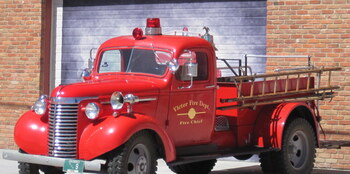 When Charles Spray (AKA Jeep Hack) was a child, this restored 1937 Fire Engine delivered Santa to the Victor Fire Station (which was located in the Victor City Hall). Photo from 2016.
When Charles Spray (AKA Jeep Hack) was a child, this restored 1937 Fire Engine delivered Santa to the Victor Fire Station (which was located in the Victor City Hall). Photo from 2016.
I have fond memories whenever I think of Christmas, the holidays and home in Victor. We’d go out to the surrounding mountains and cut a Christmas tree—usually a very tall tree as the ceilings were high. We then decorated it with all the ornaments collected over the years plus a few of the latest ones. I remember the year that “bubble lights” came into being. Fascinating! A tree loaded with silver tinsels (icicles) was a beautiful sight to behold!
When it neared Christmas we went up to the Fire Station for the annual visit of the Jolly Old Fellow, Santa Claus. The fire truck would go down town and bring him back from somewhere to the station. We’d then go in, sit on his lap, and tell him what we wanted for Christmas. He would give us a mesh sock filled with Christmas candy and a large fresh orange in the toe of the sock.
When I was little I believed all the Santa Claus stories but over the years as I got older I started to have my doubts. Not too loud of course because he might be listening and I didn’t want to get on his naughty list. I got to wondering (not out loud) why he didn’t just show up with his Sleigh and Rain Deer at the station but then in my youthful mind I got to reasoning that he probably wouldn’t have had a place to put his rig and livestock anyhow. As I got older and the mind progressed to grow I got to wondering about the “Chimney” business. We didn’t have a chimney, just a stovepipe, and how come his suit was always white and clean with no trace of ashes on the outfit. Besides that I’d quit sitting on his lap as he never gave me what I wanted for Christmas anyhow. It was also about that time I started to have vastly increased doubts about that Old Man that was supposed to be so generous. Remembering that list “thing” I still wanted to stay on his good side as I for one still didn’t want to disclaim him. A fellow just couldn’t be too careful. You never know! I finally figured out that he might be pulling the wool over my eyes and probably was getting some help from my folks.
When it neared Christmas we went up to the Fire Station for the annual visit of the Jolly Old Fellow, Santa Claus. The fire truck would go down town and bring him back from somewhere to the station. We’d then go in, sit on his lap, and tell him what we wanted for Christmas. He would give us a mesh sock filled with Christmas candy and a large fresh orange in the toe of the sock.
When I was little I believed all the Santa Claus stories but over the years as I got older I started to have my doubts. Not too loud of course because he might be listening and I didn’t want to get on his naughty list. I got to wondering (not out loud) why he didn’t just show up with his Sleigh and Rain Deer at the station but then in my youthful mind I got to reasoning that he probably wouldn’t have had a place to put his rig and livestock anyhow. As I got older and the mind progressed to grow I got to wondering about the “Chimney” business. We didn’t have a chimney, just a stovepipe, and how come his suit was always white and clean with no trace of ashes on the outfit. Besides that I’d quit sitting on his lap as he never gave me what I wanted for Christmas anyhow. It was also about that time I started to have vastly increased doubts about that Old Man that was supposed to be so generous. Remembering that list “thing” I still wanted to stay on his good side as I for one still didn’t want to disclaim him. A fellow just couldn’t be too careful. You never know! I finally figured out that he might be pulling the wool over my eyes and probably was getting some help from my folks.
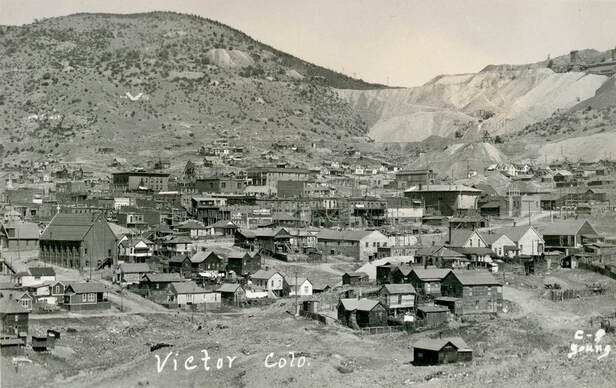 The "VHS Emblem" of white-washed rocks on Squaw Mountain can be seen in this 1938 postcard shared by La Jean Greeson. In recent years the "VHS Emblem" has been repainted as a community service project by the youngsters attending the Summer Soccer Camps operating from the Victor High School building.
The "VHS Emblem" of white-washed rocks on Squaw Mountain can be seen in this 1938 postcard shared by La Jean Greeson. In recent years the "VHS Emblem" has been repainted as a community service project by the youngsters attending the Summer Soccer Camps operating from the Victor High School building.
After the holiday all the kids would round up the bare and unwanted trees. They would be taken up on Squaw Mountain above Victor and arranged to cover the large white stone VHS emblem. On New Year’s Eve the drying trees would be lit on fire displaying a fiery spectacle viewed from all over the town below. The incoming high school freshman class, as part of their initiation, would be required to go up and re-coat the VHS with white wash. This was to be done wearing long-johns and goulashes too big for their feet.
As a climax to the season the trick was to go over to rival Cripple Creek and prematurely set fire to the trees lining their large CC emblem BEFORE their New Year’s Eve holiday celebration. I never was a witness to it, but I was told half the city of Cripple Creek would caravan over to Victor and a donnybrook would take place. So I was told!
Recollections of Life in Victor During the Depression, WWII and After by Charles Norman Spray (AKA Jeep Hack) © compiled (May 2019) and submitted by his childhood friend, Georganna McCleerey Peiffer (November 2019).
CLICK below to view companion stories by Charles Spray (AKA Jeep Hack):
As a climax to the season the trick was to go over to rival Cripple Creek and prematurely set fire to the trees lining their large CC emblem BEFORE their New Year’s Eve holiday celebration. I never was a witness to it, but I was told half the city of Cripple Creek would caravan over to Victor and a donnybrook would take place. So I was told!
Recollections of Life in Victor During the Depression, WWII and After by Charles Norman Spray (AKA Jeep Hack) © compiled (May 2019) and submitted by his childhood friend, Georganna McCleerey Peiffer (November 2019).
CLICK below to view companion stories by Charles Spray (AKA Jeep Hack):
- Memories of Washington Elementary--My First School in Victor, Colorado.
- Adventures at the Beaver Valley Ranch while Growing Up in Victor, Colorado.
- Memorabilia from Cripple Creek & Victor High School Bands Directed by Ernest T. Sly.
- Memories of the Ina & Henry Cleveland Hack Family.
- The Lighter Side of a Visit to Hack's Victor Barbershop.
- Memories of Margaret & Henry C. "June" Hack, Jr.
- A Day in the Cresson Mine.
- Firewood For Victor, Colorado.
- Sports in Victor, Colorado & Memories of the 1949 Pikes Peak Junior High School Basketball Tournament.
- Winters in Victor, Colorado during the 1940's & early 50's.
- Tragedies When I Was Growing Up In Victor, Colorado in the 1940's & 1950's.
ABOUT THE AUTHOR
Charles Norman Spray (Also Known As Jeep Hack) included this preface titled “ THE WHY OF IT ” with his memoirs. My daughter who was always telling me “Dad, write down some of the stories you are always telling me.” But I’d continue to procrastinate. Finally, to appease her I started writing. The more I continued to write, the more that came to light. Sometimes I’d worry about how to start and just how or what I wanted to say. Then I’d remember what that renowned writer of western tales Louis L’Amour once said. “Don’t wait for an idea. Don’t wait. Just Write”! He also was to have said another verbal truth, “You have to turn on the faucet before the water starts to flow”! “Just Write”.
Bear with me. I hope you have the time or inclination to put up with the ramblings and recollections of a world weary old man. Perhaps in the telling I’ve stirred up a few recollections you might have of your own life. Put them down. Don’t wait. Write them down for your grandchildren and their grandchildren to follow. The children of today need to know that some things weren’t always the way they are today--things that will never be in the history books nor be taught in the schools, things that made up your life. It’s important they know of the world you knew, what took place before I-Pods, texting, and the abuse of one of man’s greatest inventions, television.
Please forgive my grammar, spelling, punctuation and over-all abuse of the English language. The Cherokee people have no word in their language for goodbye, so I’ll just say “Happy Trails” until we meet again.
Chuck Spray
Charles Norman Spray (Also Known As Jeep Hack) included this preface titled “ THE WHY OF IT ” with his memoirs. My daughter who was always telling me “Dad, write down some of the stories you are always telling me.” But I’d continue to procrastinate. Finally, to appease her I started writing. The more I continued to write, the more that came to light. Sometimes I’d worry about how to start and just how or what I wanted to say. Then I’d remember what that renowned writer of western tales Louis L’Amour once said. “Don’t wait for an idea. Don’t wait. Just Write”! He also was to have said another verbal truth, “You have to turn on the faucet before the water starts to flow”! “Just Write”.
Bear with me. I hope you have the time or inclination to put up with the ramblings and recollections of a world weary old man. Perhaps in the telling I’ve stirred up a few recollections you might have of your own life. Put them down. Don’t wait. Write them down for your grandchildren and their grandchildren to follow. The children of today need to know that some things weren’t always the way they are today--things that will never be in the history books nor be taught in the schools, things that made up your life. It’s important they know of the world you knew, what took place before I-Pods, texting, and the abuse of one of man’s greatest inventions, television.
Please forgive my grammar, spelling, punctuation and over-all abuse of the English language. The Cherokee people have no word in their language for goodbye, so I’ll just say “Happy Trails” until we meet again.
Chuck Spray
THE PAST MATTERS. PASS IT ALONG.
The Next Generation Will Only Inherit What We Choose to Save and Make Accessible.
Please Share Your Memories and Family Connections to Victor & the World's Greatest Gold Camp
By Contacting Victor Heritage Society, PO Box 424, Victor, CO 80860 or e-mail [email protected].
The Next Generation Will Only Inherit What We Choose to Save and Make Accessible.
Please Share Your Memories and Family Connections to Victor & the World's Greatest Gold Camp
By Contacting Victor Heritage Society, PO Box 424, Victor, CO 80860 or e-mail [email protected].
VictorHeritageSociety.com
Copyright © 2023 Victor Heritage Society. All Rights Reserved.
Copyright © 2023 Victor Heritage Society. All Rights Reserved.
